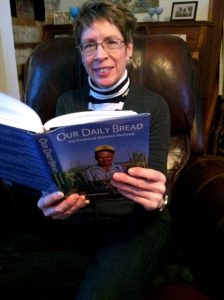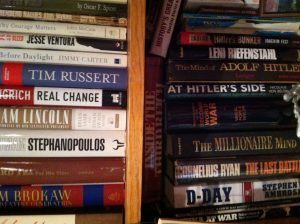I love reading biographies. History is much more understandable for me when told from a personal perspective. I read an occasional fiction book, but I much prefer real life stories.
Some of the biographies I have read in recent years that made a great impression on me include:
John Adams
Eleanor Roosevelt 1933-38
Richard Waybright (A Farmer for the World)
Norman Borlaug (Our Daily Bread by Noel Vietmeyer)
 I must say I did my fair share of underlining as I read through the many chapters of Norman Borlaug’s life. Here is a bit of background. Plant geneticist Norman Borlaug, born in Iowa in 1914 graduated from University of Minnesota in 1937, created a new wheat: high-yielding, short-strawed and disease resistant as part of a joint project involving Mexico and the United States. This plant variety was able to help feed the growing world. To paraphrase Borlaug, it was a short-term solution for man’s struggle with hunger and deprivation. His life’s work earned him the Nobel Peace Prize and Congressional Gold Medal, among other prestigious awards.
I must say I did my fair share of underlining as I read through the many chapters of Norman Borlaug’s life. Here is a bit of background. Plant geneticist Norman Borlaug, born in Iowa in 1914 graduated from University of Minnesota in 1937, created a new wheat: high-yielding, short-strawed and disease resistant as part of a joint project involving Mexico and the United States. This plant variety was able to help feed the growing world. To paraphrase Borlaug, it was a short-term solution for man’s struggle with hunger and deprivation. His life’s work earned him the Nobel Peace Prize and Congressional Gold Medal, among other prestigious awards.
Here are some highlights of his life, paraphrased, that really hit home with me, given our current environment where the public is questioning technology used to produce food:
- Norm’s family had never surpassed 25 bushels an acre yield but one test plot with fertilizer planted by vo-ag students got 50 bushels per acre! Norm would never forget lessons learned from this early experience, nor did he forget that rural prosperity depends on seed and fertilizer.
- At 30, he started to put his science to work aiming to bring Mexico’s impoverished farmers out of poverty and hunger.
- He hired Mexican boys, who began by scaring off sparrows, and subsequently became cross-pollinators of wheat. Many of the gene matches that eventually fed the world were made by them.
- Mexican farmers discovered that Norm’s seeds provided a ticket out of poverty. They soon learned they could double their output, AND double their income. Norm was having an effect on hunger.
- He ultimately traveled to Pakistan, India and other countries guiding and cajoling political leaders and farmers so they could improve their self- sufficiency with better wheat varieties and fertilizer. India’s society was turning against science at first.
- Norm was passionate about wheat breeding. His teaching allowed others to grasp his knowledge and skills, which they carried home to their nations. These were his “Wheat Apostles.”
- He was most proud of his role in introducing little league baseball in Mexico, which would help thousands of youth pull themselves up from poverty through science and through sport.
Modern technology gives us safe, high quality food using the resources on our planet most efficiently. As farmers, we can help ensure that we have enough food to feed the planet. Norman Borlaug would be proud.
“His life teaches us that we write our own destiny, and that one person, bending over seedlings under the Mexican sun, can change the world.” Pioneer Press, Minnesota
 The next books on tap for me to read are:
The next books on tap for me to read are:
Limping Through Life by Jerry Apps (Wisconsin author)
The Prince and the Nanny (King of Norway)
The Guggenheims
What do YOU like to read?


Leave a Reply